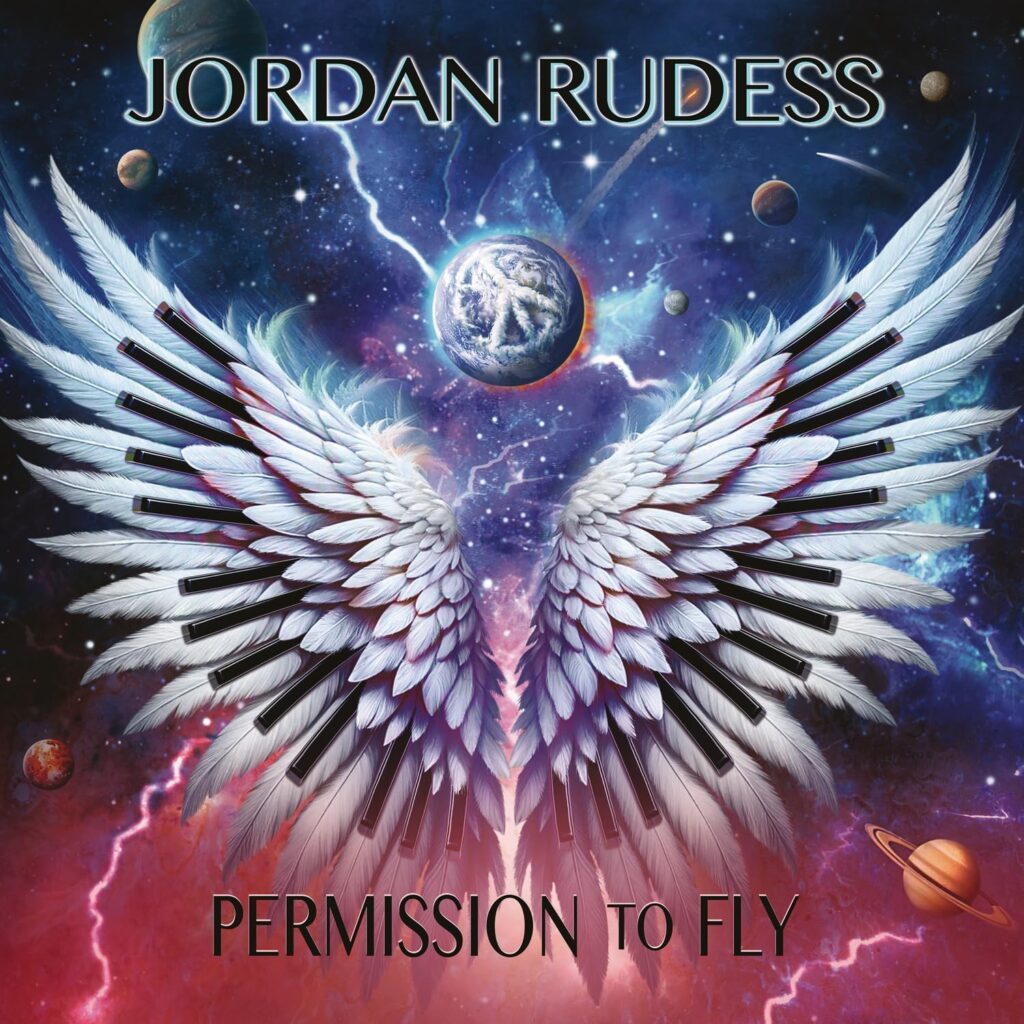
To see Jordan Rudess with Dream Theater is to see a man possessed. Locked away in a cage made of keyboards, synths, Roli Boards and more, you have to look twice just to make sure he hasn’t hidden a third arm somewhere amidst it all. Similarly, as a solo artist, he allows full reign to his muse, the range of sonic quirks standing as markers of his unique musical identity and, while the results are less metallic than Dream Theater, they’re just as theatrical.
Now back with a new album, Permission To Fly, Jordan has joined forces with That Joe Payne (vocals), Darby Todd (drums), Steve Dadaian (guitars), and Bastian Martinez (guitars), for an album of energetic and varied prog that, in taking Jordan’s myriad influences into account, emerges as refreshingly unique in the process.
The album opens in what might be termed Dream Theater-lite mode, Jordan’s energetic keys battling chunky guitars and Darby’s explosive performance on the drums. However, appearances can be deceptive and, having kicked things off, the track suddenly reverses itself to allow for a much lighter-of-touch outing than might be expected. With Joe’s soaring vocals providing the piece with its emotional core, Jordan and his band weave a wonderfully compelling backdrop around him, and the results are rather beautiful. It’s followed by Into The Lair, a longer track that sees Jordan and his band exploring a range of sounds to emerge as a sort of cross between prog rock and jazz fusion, at times not dissimilar to Ayreon’s work and even nodding in the direction of Queen with its epic vocal arrangements.
Following so acrobatic a piece is no easy task, and Jordan wisely does not attempt to compete, offering instead a multifaceted pop-jazz track titled Haunted Reverie. With a taut beat and baffling introduction, it provides the perfect mix of Jordan’s innate pop sensibilities and his rather more outré tendencies. It’s followed by The Alchemist – which emerges from a cinematic introduction to find Jordan’s fingers flashing across the keys. Having drawn the listener in, the track then takes a turn towards nimble robo-rock, the synths and drums driving it ever forward, only for jazz and prog to coalesce once more in a truly dizzying display. Musically entrancing, it is also perfectly positioned for Joe, who has a blast testing his exceptional vocal range against it all.
Rather more restrained, the piano-led ballad Embers is a pretty tune that sits somewhere between latter day Genesis and Systematic Chaos-era Dream Theater. Benefitting from a more restrained approach than its ebullient forebear, it’s followed by another calmer piece titled Shadow Of The Moon, which sees Joe’s voice settled on a warm bed of synth. Initially, it feels like something of a misstep to place two similarly paced pieces next to one another, but when the track opens out into a gorgeous, Queen-influenced chorus, all misgivings are put aside and you realise the depth and diversity of Jordan’s vision. The guitars lead the way on the menacing, mid-tempo march of Eternal, only for Darby Todd to unleash a complex percussive barrage that draws this enigmatic epic in all sorts of different directions, sometimes all at once. After so monstrous a workout, the gentle ballad, Footstep In The Snow, provides a welcome palette cleanser, leaving the way clear for the closing instrumental, Dreamer, to work its magic upon the listener. Gaining greater emotion in its instrumental restraint, it recalls the sublime work of Samuel Barber and it quietly brings the curtain down on this mesmerising album.
The digipack edition entices fans with a pair of bonus cuts. The first of these sweeps aside the ambience of Dreamer to unleash a fast-paced, Eastern-tinged sonic assault. Titled Incarnation, it feels rather more like a demo than a finished piece, with the production strangely tinny compared to the rest of the album. Enjoyable enough, it showcases a very different set of musical sensibilities to anything found on the album, but it’s easy to see why it was left on the cutting room floor. The second piece, Nocturne In Fm is a simple enough piece that pairs the piano and strings to dreamlike effect. As with the other bonus track, it would have felt out of place as part of the album’s main sequence and so, while it’s a nice to have, it’s certainly not essential.
Jordan Rudess is one of those rare musicians who not only has a restless muse, but also delights in the chase. You can’t help but picture him behind his keyboards, a twinkle in his eye as he lays down the templates for these endlessly evolving pieces, but it’s not the technicality that draws you in so much as his obvious love of tracing his epic vision amidst the clouds. A rich, multi-hued album that benefits from a stellar supporting cast, while Permission To Fly may feature a number of sweeping, ambitious set pieces, it’s key feature is just how much fun it all is. Turn the lights low, the volume high, and lose yourself inside Jordan’s technicolour world of wonder. 8.5/10



